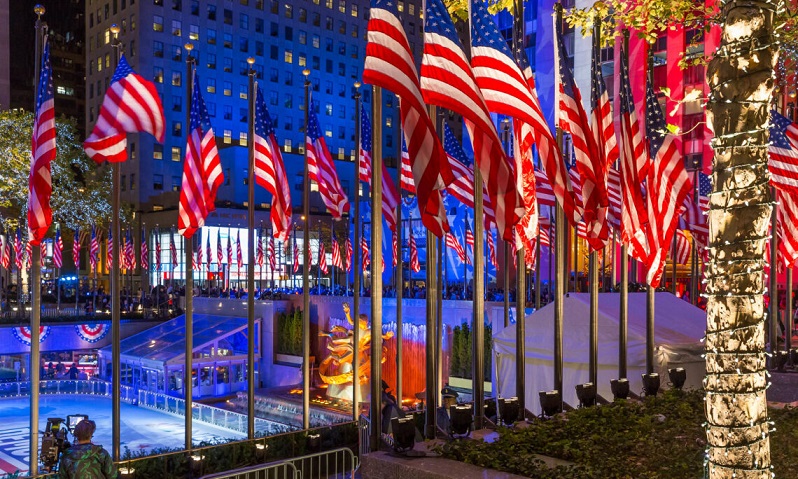Ruben Carranza cooked a green curry with beef, bought take-away adobo from a Filipino turo-turo and had fresh mangoes, mochi and plenty of hot coffee on stand-by. “It will be the most stressful election night ever,” he says. Carranza, who lives in New York and is a senior human rights lawyer at the International Center for Transitional Justice, does most of the cooking in his household. He is working from home, his children attend school on their laptops also from home, and his wife goes out to her law office. “People around here have been stockpiling on food again,” he laments. “Fascism plus pandemic is that kind of combo you can’t just order at a McDonald’s.”
Oddschecker, the online betting site, has configured the US elections like a two-horse race. In round terms, 8-13 odds on Senator Joe Biden means that, as of the start of polling day, he has roughly 60 perccent probability of winning. President Trump’s 6-4 odds translates into a 40% chance of winning. No-one anywhere is likely to get a good night’s sleep.
Everyone’s nerves are frayed to breaking point. Trepidation, tensions, and emotion run high, with good reason.
America is at a pivotal moment.
Whoever sits in the White House will determine whether the lurch towards planetary overheating will be arrested or accelerated, whether international alliances will be restored or reneged on, whether multilateral institutions will be respected or repudiated, whether authoritarian despots – from Moscow to Tehran, Beijing to Pyongyang – will think twice or operate unhindered, and whether the world’s most powerful democracy will survive with even a shred of credibility.
All of us are on the cusp of two opposing worlds.
Americans have felt the worst of it. They have borne the brunt of a catastrophic mishandling of the Covid-19 pandemic. Governmental negligence has resulted in surging infections (nine million and rising) and deaths (over 230,000 and rising).
More than ever, American families are struggling to stay employed, housed and fed. At the end of August, almost 30 million people were forced to depend on some form of state benefit, according to data from the US labor department.
Add to this the fury and the sadness that engulfed almost every American city over the summer. Thousands marched to protest police brutality and the killing of George Floyd and so many other black Americans. The anger that triggered the Black Lives Matter movement blow-torched away the veneer that hides systemic racial inequality and spot-lit the raw ugliness and lethality of American racism. Few predicted the ensuing conflagrations in New York, Seattle, and Minneapolis.
An unprecedented number of Americans, 100 million and counting, have now gone to the polls and cast their ballots. The New York Times (3/11/2020) has been mapping the issues that are driving thousands to vote. People across the country have said that they are voting for affordable health care coverage, for equality in access to education, for women’s reproductive health care rights, for greater representation, for a return to trust and decency.
The Asian-American vote amounts to 5 percent of the total voting population. In an article published in the South China Morning Post (31/10/2020), Raissa Robles conveys the painful opposing political views dividing Filipino-American voters. While 52 percent tend to lean Democrat, 34 percent per cent will vote Republican. Republican Filipino-Americans, Robles finds, regard Trump’s racism, anti-immigration policies, sexism and chronic tax evasions, as “non-issues.” Further, Trump’s support for President Duterte merely added to his appeal.
Well known on social media for her critical stance on Duterte’s presidency and for being the daughter of the Philippine president’s younger brother Emmanuel, Nuelle Duterte turned to chocolate. She likes milk chocolate but has a particular fondness for the chocolate of her home-city – the Davao-made strong, dark Malagos brand of chocolate. “I’m afraid I don’t cook. I have only chocolate as my comfort food,” says the psychiatrist and long-time resident of New York. “I’m not going to stress over it [the elections] because I know it’ll be crazy.” Should things turn out for the worse, Nuelle is keeping her options open and may well flee America.
In Seattle, Vicente Rafael, professor of history at the University of Washington, braced himself for a fraught night. His partner, Lila Ramos Shahani volunteered for the Filipino-Americans for Biden-Harris campaign. Rafael, who describes his cooking as “pedestrian,” said they ate adobo, his comfort food. On election night, Rafael held back on the soy sauce and went to town on the vinegar, garlic, pepper, and ginger.
Rafael’s rich adobo flavors seem emblematic of the moment – high sour notes, plenty of heat, and sharply peppery.
Feminist, activist, and iconic Philippine novelist Ninotchka Rosca decided, uncharacteristically, not to eat at all. She chose to tune out. “I will be entering a yogic trance for four hours, at least,” the New Yorker said.
The views in this column are those of the author and do not necessarily reflect the views of VERA Files.
